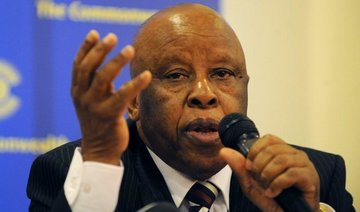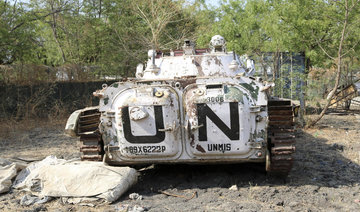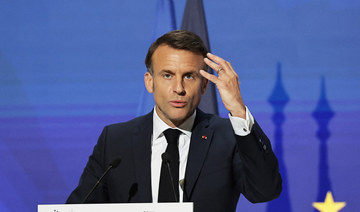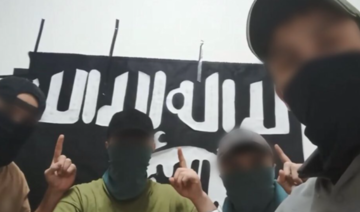SOUTH SUDAN: South Sudan's opposition is threatening to resort to "guerrilla warfare" if peace talks in Ethiopia fail in the coming days as government forces advance on remaining rebel strongholds in the fifth year of civil war.
"We will keep fighting from the bush by using insurgencies and tactical strategies," James Otong, general deputy commander for the armed opposition, told The Associated Press during a visit to the rebel-held town of Akobo, near the Ethiopian border.
Untold tens of thousands of people have been killed and millions displaced since the world's youngest nation plunged into civil war in late 2013. Although high-level peace talks are set to resume on Feb. 5, opposition forces accuse the government of being more interested in "waging war" than in ending the conflict. The government says it acts only in self-defense.
The international community is openly frustrated with both sides as a cease-fire that took effect Dec. 24 was violated within hours. The United States is pressing the UN Security Council to impose an arms embargo on South Sudan, saying its leaders are "betraying" the country.
In Akobo, one of the last opposition strongholds, the AP spoke with several displaced families who said they fled recent attacks by government forces.
"They're probably dead," Nyakum Well said of her missing children, choking back tears as she sat in her small teashop under a tree. "If (President) Salva Kiir's government captures any human being they kill them."
Five days earlier, the 27-year-old was separated from her two young children when government troops attacked her town of Pieri, killing civilians and burning houses, she said.
Aid workers in Akobo estimate that 100 people have been flowing in daily since the middle of January. Local authorities are concerned the town will be targeted next.
Conflict experts said Akobo is considered the most "strategic and symbolic" of the remaining rebel-held areas and that the government is attempting to walk a "diplomatic tightrope" between advancing militarily and appeasing the international community.
"The government thinks it is winning the war militarily, so it doesn't see any reason to cede any real power through peace negotiations," said Alan Boswell, the South Sudan analyst for Small Arms Survey, a Geneva-based group focusing on armed violence.
Even if the rebels continue guerrilla warfare, they lack the resources to threaten the regime or "protect the civilian population from government assaults," Boswell said.
In recent months the opposition has ceded critical ground to the government, including the town of Lasu, its headquarters in the Equatoria region. The rebels still control a handful of areas across the country and roam freely in many rural areas, while key towns and the cities are under government control. It is not clear how many rebels are still fighting.
South Sudan's army denies claims that it is focused on expanding its territory, saying there's no strategy to intensify the war.
"We're focused on winning the minds and hearts of our people," army spokesman Lul Ruai Koang said.
Yet the international community's patience is fading quickly.
"It is long past time for the leaders of South Sudan to get serious and put the interests of the people of South Sudan before their own personal gain," Mark Weinberg, public affairs officer for the US Embassy, told the AP. He said the US and regional bodies will find ways to hold those who "block peace" accountable but didn't elaborate.
A past US attempt under the Obama administration to have a UN arms embargo imposed on South Sudan failed without enough support from Security Council members. On Saturday, UN Secretary-General Antonio Guterres told African regional bodies he didn't think such "tougher measures" can come from the Security Council and that they need to come from the region instead.
Speaking ahead of the new round of peace talks, the chairman of the independent Joint Monitoring and Evaluation Commission, Festus Mogae, condemned South Sudan's leaders for signing a cease-fire agreement one day and allowing its "violation with impunity" the next.
"It is now time to revisit the range of practical measures that can be applied in earnest to those who refuse to take this process seriously," Mogae said.
South Sudanese who are weary of the fighting doubt that a solution is in sight when peace talks resume in Ethiopia's capital, Addis Ababa.
Sheltering in her makeshift home in one of Akobo's rundown schools, 27-year-old Nyajok Kir said her son was killed one week earlier when government troops stormed her town of Yuai and started indiscriminately shooting civilians.
"There was an agreement in Addis before," she said, hanging her head. "But (President) Kiir doesn't like the peace."
South Sudan rebels vow 'guerrilla war' if peace talks fail
South Sudan rebels vow 'guerrilla war' if peace talks fail

Little hope of Ukraine breakthrough during Xi France visit: observers

Xi is due to make a state visit to France on Monday and Tuesday
PARIS: French President Emmanuel Macron will next week make a new push to try and dissuade China’s Xi Jinping from supporting Russian President Vladimir Putin’s war against Ukraine but is unlikely to make a breakthrough on ending the conflict during the visit, observers say.
President Xi’s visit is set to be rich on symbolism — with a sumptuous dinner at the Elysee Palace and a trip to the Pyrenees mountains planned — but risks being short on diplomatic success for the French leader.
“France and the European Union expect him to use his influence on Russia, but Xi Jinping has nothing to offer on Ukraine,” said a former European diplomat, asking not to be named.
Xi is due to make a state visit to France on Monday and Tuesday, followed by visits to Serbia and Hungary, two European countries retaining warm ties with Russia.
While Xi and Macron will discuss international crises, trade, climate change and cultural exchanges, the key aim will be to “point out that for Europe, the first issue with China is its position on Ukraine,” said a source close to the French government.
On a visit to China in 2023, Macron had already called on Xi to “bring Russia to its senses” over Ukraine and urged him not to deliver weapons to Moscow.
Little has changed, however. Xi will host Putin for talks in China later this month.
Macron, 46, indicated he had not given up on the idea of trying to get Xi, 70, on his side.
“It’s not in China’s interest today to have a Russia that destabilizes the international order,” the French president said in an interview with The Economist published on Thursday. “We need to work with China to build peace.”
European Commission President Ursula von der Leyen, who has urged Beijing to play a greater role in ending the Ukraine war, will join Macron and Xi for talks on Monday.
Macron has said he will ask the Chinese president to help him achieve that aim when he visits Paris, which is preparing to host the Olympic Games this summer.
There is a historic tradition that peace should reign during the Olympics — although the opening of the Games in Beijing in August 2008 did not halt Russia’s invasion of Georgia.
“On Ukraine, China has done nothing,” said Marc Julienne, director of the Center for Asian Studies at the French Institute of International Relations (IFRI).
In February 2023, China published a 12-point position paper on Ukraine, but it was rejected by Kyiv and its Western allies.
Beijing, which says it is a neutral party in the Ukraine conflict, has been criticized for refusing to condemn Moscow for its offensive.
The United States had accused China of helping Russia carry out its biggest militarization since Soviet times.
US officials say China has provided dual-use supplies that have let Russia regroup in the face of a long delay in US aid to Ukraine.
In April, US Secretary of State Antony Blinken said this included “machine tools, semiconductors, other dual-use items that have helped Russia rebuild the defense industrial base that sanctions and export controls had done so much to degrade.”
China has rejected the US claims as “groundless accusations.”
Macron, too, is expected to raise “concerns” about “the activity of certain Wuhan companies that could be directly involved in or contribute significantly to the Russian war effort,” according to a member of his team.
Beijing is a major supporter of the Russian economy.
China-Russia trade in 2023 reached a record $240 billion, according to customs data, overshooting a goal of $200 billion set by the neighbors.
Experts say Beijing is unlikely to renounce support for Moscow, which it sees as a priority partner in its opposition to the United States.
“Xi Jinping’s priority is the Global South,” said Emmanuel Lincot, a China expert at the Catholic University of Paris.
“There is a congruence in the Sino-Russian bilateral relationship, particularly in the desire to counter the West. Which is not to say that there is no rivalry.”
Human rights group begins legal action over UK’s Rwanda migrant policy

- The group said the government’s Safety of Rwanda policy document was inconsistent with the new law
LONDON: Human rights group Asylum Aid said on Friday it had launched a legal challenge to the British government’s policy of sending asylum seekers to Rwanda in the wake of a new law which seeks to pave the way for the scheme to be put into operation.
The group said the government’s Safety of Rwanda policy document, published on April 29, was inconsistent with the new law which was passed by parliament last month to override a ruling by the UK Supreme Court that the scheme was unlawful.
Britain sanctions Israeli groups, individuals for violence in West Bank

- The four individuals sanctioned were responsible for human rights abuses against Palestinian communities in the West Bank
LONDON: Britain on Friday imposed sanctions on two “extremist” groups and four individuals in Israel who it blamed for violence in the West Bank, its latest package of measures against Israeli settlers.
Britain’s Foreign Office named Hilltop Youth and Lehava as two groups which it said were known to have supported, incited and promoted violence against Palestinian communities in the West Bank.
The four individuals sanctioned were responsible for human rights abuses against these communities, the statement added.
Among them are Noam Federman, who has trained settler groups in committing violence and Elisha Yered, who has justified killing Palestinians on religious grounds.
Violence in the West Bank was already on the rise before Israel’s assault on Gaza, which was triggered by an Oct. 7 Hamas-led attack on southern Israel.
It has escalated since, with stepped-up Israeli military raids, settler violence and Palestinian street attacks.
British foreign minister David Cameron said extremist settlers were undermining security and stability and threatening the prospects for peace.
“The Israeli authorities must clamp down on those responsible. The UK will not hesitate to take further action if needed, including through further sanctions,” he said.
Those sanctioned will be subject to financial and travel restrictions. Britain previously imposed sanctions on four Israeli nationals in February.
Universities take steps to prevent pro-Palestinian protest disruptions of graduation ceremonies
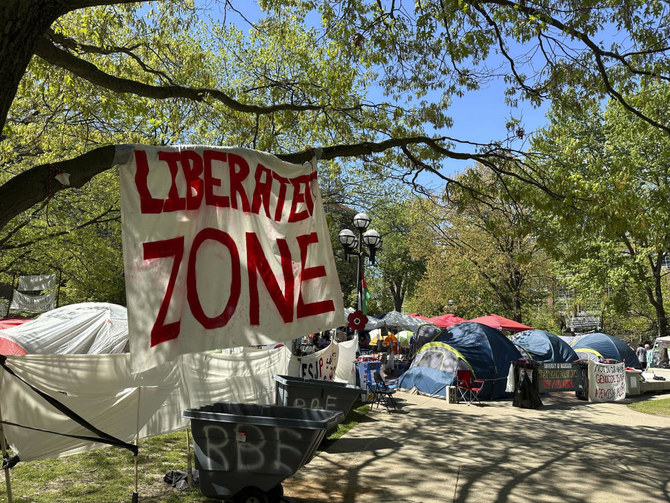
- Students booed and yelled “free Palestine” while the University of Utah president spoke Thursday night at commencement
- “People can exercise their First Amendment rights without disrupting or creating fear,” Burdick said of protesters
MICHIGAN, USA: With student protests over the Israel-Hamas war disrupting campuses nationwide, several major universities are intent on ensuring that commencement ceremonies — joyous milestones for graduates, their families and friends — go off without a hitch this weekend.
It won’t be easy. Colleges are hiring extra security, screening attendees at venues and emphasizing that significant disruptions by pro-Palestinian protesters won’t be tolerated. At the same time, they’re pledging to honor free-speech rights by designating protest zones.
Students booed and yelled “free Palestine” while the University of Utah president spoke Thursday night at commencement. He paused his speech to ask those who were protesting to leave or be removed. Outside the ceremony in Salt Lake City, a group of about 50 people were rallying. There was one arrest.
“Milestone is a perfect word,” said Ken Burdick of Tampa, Florida, describing his daughter’s graduation Saturday at the University of Michigan. He hopes the big day goes untarnished.
“People can exercise their First Amendment rights without disrupting or creating fear,” Burdick said of protesters.
Here’s how some schools are planning to balance things:
UNIVERSITY OF MICHIGAN
More than 8,000 graduates — and 63,000 spectators — are expected for Saturday’s festivities inside Michigan Stadium, known as The Big House. There will be security screening, and disruptive protesters could be subject to removal. Public safety officers and staff who commonly monitor major events, such as fall football games, will be present. Author and historian Brad Meltzer is the featured speaker.
In March, an annual event recognizing students with high academic achievement ended early when pro-Palestinian protesters raised provocative signs and drowned out remarks by President Santa Ono, yelling, “You are funding genocide!” The university subsequently drafted a policy that could lead to student expulsions and staff dismissals for event disruptions, though it hasn’t been finalized.
“It was painful for everyone who had gathered — and especially so for members of our Jewish community,” Ono said two days later.
Protesters have erected dozens of tents on the Diag, a historic space for campus activism more than a mile away from the stadium. They’re demanding that Michigan cut financial ties with companies connected to Israel. There has been no effort to break up the encampment and no arrests.
“We respect and uphold the principles of free expression, and also recognize that no one is entitled to disrupt university activities,” Laurie McCauley, Michigan’s chief academic officer, said in an email to students and staff about commencement.
Blake Richards, 25, is earning a bachelor’s degree in biochemistry. Richards plans to be at the football stadium Saturday after participating in a smaller ceremony Thursday for chemistry students.
“It could take away some great feelings, muddle them,” Richards said of any disruptions. “But truth be told, I’m not bothered. I know others have different opinions; I’m just happy to be here.”
INDIANA UNIVERSITY
The Bloomington, Indiana, campus is designating protest zones outside Skjodt Assembly Hall and Memorial Stadium, where ceremonies will be held Friday for graduate students and Saturday for undergraduates. Nearly 10,000 students are eligible to attend.
A social media post circulating on Instagram urged protesters to wear “your keffiyeh along with your cap and gown” and walk out during Saturday’s remarks by President Pamela Whitten.
Roughly 20 tents set up by protesters remained in place this week in an area known as Dunn Meadow, a mile from the stadium. Dozens of protesters have been arrested there recently, according to the Indiana Daily Student.
Maya Wasserman, a 22-year-old senior in management who is Jewish, said she and her family feel uncomfortable about the prospect of pro-Palestinian protests disrupting commencement. She expressed special concern for her mother and grandmother, who are Israeli.
“It’s unfortunate because we want this event to be about graduating, not politics,” Wasserman said.
At Dunn Meadow, students in lawn chairs or on blankets worked on their final assignments. Jessica Missey, a 20-year-old protester and senior, said she boycotted final exams; some professors, she said, simply canceled them. She has enjoyed the camaraderie at the encampment.
“Commencement is kind of just taking almost a little sidestep for me,” said Missey.
NORTHEASTERN UNIVERSITY
A week after police arrested nearly 100 protesters at Northeastern University, the school is holding its commencement exercises Sunday at Fenway Park, home of the Boston Red Sox, for the fourth consecutive year.
The venue will help security officials monitor the crowd and limit what people can bring. Signs, banners, balloons and full-size flags are prohibited in the stadium, along with most bags. Renata Nyul, vice president for communications, said public safety staffing will be strengthened.
All those entering Fenway will need to pass through metal detectors. About 50,000 graduates, family and friends are expected.
Northeastern is one of several universities in the Boston area that have had pro-Palestinian encampments. Some have let the protests continue, though Northeastern’s camp was broken up.
“While we realize that issues in the world prompt passionate viewpoints, the focus this weekend should be on our graduates and their remarkable achievements,” Nyul said.
German foreign minister says Russia will face consequences for cyberattack. NATO, EU show support

- “Russian state hackers attacked Germany in cyberspace,” Baerbock said
- “This is absolutely intolerable and unacceptable and will have consequences”
BRUSSELS: Germany’s top diplomat on Friday said Russia will face consequences after accusing its military intelligence service of masterminding an “absolutely intolerable” cyberattack, as NATO and European Union member countries said they will not let Russia’s “malicious” behavior in cyberspace go unanswered.
Relations between Russia and Germany were already tense, with Germany providing military support to Ukraine in its ongoing war with Russia.
German Foreign Minister Annalena Baerbock said Russian state hackers were behind a cyberattack last year that targeted the Social Democrats, the leading party in the governing coalition.
“Russian state hackers attacked Germany in cyberspace,” she said at a news conference in the Australian city of Adelaide. “We can attribute this attack to the group called APT28, which is steered by the military intelligence service of Russia.”
“This is absolutely intolerable and unacceptable and will have consequences,” she said.
The Council of the EU later said that Czechia’s institutions have also been a target of the cyber campaign.
In a statement by the EU’s top diplomat, Josep Borrell, the bloc’s nations said they “strongly condemn the malicious cyber campaign conducted by the Russia-controlled Advanced Persistent Threat Actor 28 (APT28) against Germany and Czechia.”
The EU noted that it had previously imposed sanctions on individuals and entities responsible for APT28 attacks targeting the German parliament in 2015. It said it will not tolerate the continuation of such attacks, particularly with EU elections upcoming in June.
NATO said that APT28 targeted “other national governmental entities, critical infrastructure operators and other entities across the Alliance,” including in Lithuania, Poland, Slovakia and Sweden.
“We are determined to employ the necessary capabilities in order to deter, defend against and counter the full spectrum of cyberthreats to support each other, including by considering coordinated responses,” said the North Atlantic Council, the principal political decision-making body within NATO.
Baerbock is visiting Australia, New Zealand and Fiji, with the trip focusing on security policy as China pushes for influence in the Pacific region.
“The defense cooperation between Germany and Australia is close and we would like to deepen it further and together expand it, because we are in a situation where we face similar threats,” said Baerbock, who is the first German foreign minister to visit Australia in 13 years.
Discussions between Baerbock and Australia counterpart Penny Wong centered on the conflict in Gaza. “I think we all understand that the only path out of this cycle of violence that we see in the Middle East at such great cost is one that ultimately ensures a two-state solution,” Wong said.


